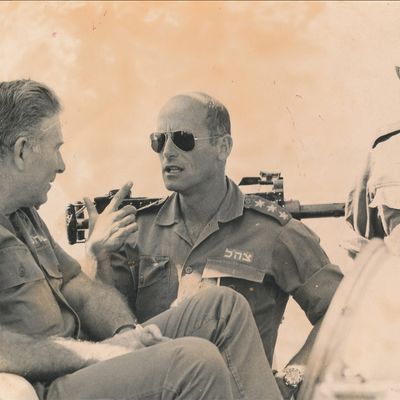
Dror MorehÔÇÖs documentary The Gatekeepers is shockingly lucid. It begins with the claim that the leaders of IsraelÔÇÖs secretive and often ruthless intelligence agency, Shin Bet, have never spoken publicly about their work ÔÇö until now. The question hangs: Why now? Do these men ÔÇö there are six ÔÇö aim to justify their killing in the eyes of history? To remind the world of the innumerable threats to their countryÔÇÖs existence? To affirm the necessity of a hard line against Palestinians who blow up civilian buses and lob missiles over borders? Actually, no. They are different kinds of men, but their conclusions are remarkably similar: that a series of repressive and/or opportunistic Israeli politicians have endangered ÔÇö perhaps murdered ÔÇö any chance of a lasting peace. ThatÔÇÖs right, folks, itÔÇÖs the spooks taking the long view. You know the Holy Land is an unholy mess when the professional paranoiacs with a license to kill come off like peaceniks.
The Gatekeepers doesnÔÇÖt play like agitprop. The storytelling is strong, the images stark. The camera roams among multiple monitors showing multiple satellite views while an ambient score works on your nerves. Moreh edits riot footage with a shiv. The Shin Bet leaders are vivid camera subjects, triangulating before your eyes: What do I want to say? What may I say? What must I say? For all their grievances, they have much to boast about. They were adroit. After IsraelÔÇÖs decisive victory in 1967, they were charged with keeping tabs on a nebulous enemy in places like Nablus: They learned Arabic, studied their enemy village by village, tried to see the world through Palestinian eyes. They werenÔÇÖt tasked with long-term strategy, only tactics. Avraham Shalom, the oldest and ÔÇö for many of us ÔÇö scariest of the gatekeepers, said it was a kind of relief when Palestinian terrorists arose because it gave his agency a way to justify its existence. At first, he sounds the way you expect a spymaster to sound, like a creep: He squirms and blinks and gives half-answers to questions about a Palestinian bus hijacker taken alive and beaten to death by security forces. He says ÔÇ£Forget about moralityÔÇØ when youÔÇÖre dealing with terrorists. But not even he forgets entirely.
The Gatekeepers takes a sharp turn at the halfway mark, when Moreh gets to the right-wing religious extremists who blindsided Shin Bet with a plot to blow up the Dome of the Rock out of some looney belief in Armageddon and later opposed the Oslo Accords during Yitzhak RabinÔÇÖs second term. You feel for the poor mieskeit Carmi Gillon, who says he tried in vain to get Rabin to wear a bulletproof vest and had to resign when a punk nonentity named Yigal Amir changed the course of world history. The politicians ÔÇö in bed with the religious right ÔÇö let Jewish ringleaders go free and open the floodgates to illegal settlers. No one agrees about the size of bombs you drop on terrorist masterminds: a quarter-ton leaves them uninjured, a ton kills them plus innocent women and children. Is a long-term strategy ÔÇö as opposed to ┬¡tactics ÔÇö even possible?
Ami Ayalon emerges the most thoughtful, though the others make sense too. Can you imagine an American hawk saying, as Avi Dichter does, ÔÇ£You canÔÇÖt make peace with military meansÔÇØ? Can you imagine one quoting Carl von Clausewitz, as Ayalon does, to the effect of ÔÇ£Victory is the creation of a better political reality?ÔÇØ How about this, from Shalom: ÔÇ£WeÔÇÖve become ÔǪ ┬¡cruelÔÇØ? Or (Ayalon again): ÔÇ£We win every battle but lose the warÔÇØ? I think I know why the six Shin Bet leaders have put their faces and ┬¡voices out there in defiance of precedent and perhaps even military sense. As a tactic itÔÇÖs risky, but theyÔÇÖve finally decided itÔÇÖs time to stop leaving the strategy to the spineless and the crazy.


